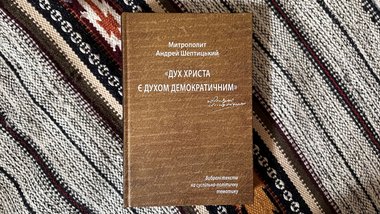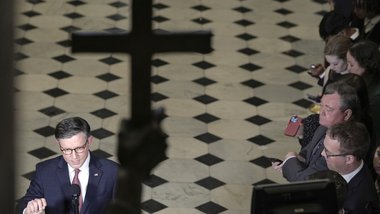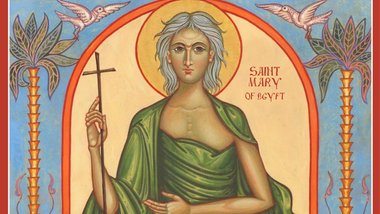A Council without Conciliarity or Rebellion in Odessa
(Notes of a witness to a local council meeting of the UOC)
It was at a meeting of Ukrainian Orthodox Church delegates in Kyiv on 17 January, which was officially presented as a forward to the Local Council of the Russian Orthodox Church, that I saw for myself that such things happen. The main event of the forthcoming nation wide council in Moscow is the election of a new patriarch. The council’s agenda should also include the status of the UOC, whose bishops asked for autocephaly in 1991, and many other things. Indeed, Ukrainian delegates had much to talk about.
At first, everything was going smoothly. One couldn’t anticipate anything unusual until a cluster of church activists suddenly appeared from heaven knows where. They beckoned approaching delegates not to allow the autocephaly of the UOC, toting posters that read “give us back father so-and-so… ” Later, the meeting itself was undercut by the impassioned chanting of church activists. This thing is, in the last few years, the presence of these activists has become a permanent attribute not only of meetings of the canonical Ukrainian Orthodox Church and its bishops’ Councils, but sometimes even of the sessions of the UOC Sacred Synod. In effect, nobody was surprised.
The session was to begin at 1:00, but it began a bit later. His Eminence Metropolitan Volodymyr arrived late, which can be understood considering his status and state of health. In all fairness though, many of the delegates were not punctual either, including Metropolitan of Odessa Agaphangel and Metropolitan of Donetsk Illarion, who came in together 20 minutes late, looking as if they had come to some prior agreement.
At the beginning of the session, Metropolitan Volodymyr welcomed the delegates and pointed out the necessity of preserving church unity and taking steps to overcome the schism in Ukrainian Orthodoxy. His Eminence also pointed out the necessity of discussing actual problems and adopting realistic resolutions through proposals that will be brought to the forthcoming Local Council.
After the opening address, the floor was given to Archbishop Mytrophan of Bila Tserkva and Boguslav, an administrative manager of the UOC, who acquainted the delegates with the Council’s agenda and the procedure for the Patriarch’s election. The only “surprise” of the first part of the meeting was Bishop Aleksii (Hroha) of Belgorod-Dnistrovskyi’s unceremonious demand to switch from Ukrainian to Russian, justified by the fact that not all delegates from Odessa understood Ukrainian. For many, such a demand, expressed quite rudely, seemed strange; even Russian-speaking Ukrainian citizens – who do not speak Ukrainian – understand the language. But being a diplomatic man, Archbishop Mytrophan complied, though his face was filled with indignation.
After Archbishop Mytrophan’s speech, His Eminence Metropolitan Volodymyr presented his main report in Ukrainian. This time, Bishop Alexei kept silent. Everyone listened carefully as the Metropolitan explained that he would not be a candidate in the election for Patriarch. There were mixed reactions – applause mixed with partial disappointment – but the general feeling was one of respect and esteem – I would even say reverence – for his choice (the fact that His Eminence Metropolitan Volodymyr prefers to stand before God as the 121st Metropolitan of Kyiv as opposed to the 16th Patriarch of Moscow has become an aphorism within the Church). However, as the following events would show, “the sacred place is never empty.”
As a permanent member of the Holy Synod of the ROC and an experienced hierarch repeatedly taking part in Hierarch Assemblies and Local Councils, His Eminence also spoke about the requirements of the ROC Statutes, according to which all decisions of the hierarchical assemblies must be subsequently approved or, to be more accurate, ratified by the Local Council. One such decision to be approved is the question of the status of the Ukrainian Orthodox Church, which was granted the status of a self-ruled church with rights of wide autonomy by the hierarchical council of the ROC on 25-27 October 1990. His Eminence suggested to the gathering to express their satisfaction with the existing state in a resolution and to delineate how changes to the present status could result in another schism. These words were met with the applause.
Because the church schism is problematic not only for Ukraine, but for the whole Russian Church, His Eminence proposed to form a special commission that would include not only hierarchs of the Ukrainian and Russian Church, but also theologians from both sides. They would be able to offer unique variants of solving of the Ukrainian church problem and would be accountable to the Assembly of Hierarchs, according to Metropolitan Volodymyr.
And then it all began. No sooner had His Eminence spoke his last words, Andrii Novikov (a cleric of the Odessa Eparchy) jumped to his feet (flew up, after an indicatory glance from Metropolitan Agaphangel, according to witnesses). He noted that the ruling allowing self-government and the rights for wide autonomy to the UOC was made only due to pressure from Filaret Denysenko. So, he continued according to his own logic, should we not think about abolishing it? Metropolitan Agaphangel supported this logic, declaring that all decisions of that time have a relative (!) value, so far as they were made under Filaret’s pressure.
“Maybe we should also return to an Exarchate!” Metropolitan Sofronii of Cherkasy parried sarcastically.
Novikov trudged on: “It is inadmissible to bring the Ukrainian Church problem up for discussion before all Orthodoxy, as far as Ukraine is a canonical territory of the Moscow Patriarchate; Washington stands behind Constantinople and other Greek Churches!”
“But we received Christianity from them!” some archimandrite cried out from the back rows.
Then Rev. Andrii began to explain that many things had changed since those times, that Greece is not the same, that its Orthodoxy is not what it once was. For him, it is necessary revisit the “political Orthodoxy” outlined by the Assembly of Hierarchs of the UOC in December 2007.
Vicar-Bishop Aleksiy (Grokha) of Belgorod-Dnestrovskii supported his Metropolitan: “we do not need a new commission to overcome a schism.” These words instigated Metropolitan Sofronii, who joined the discussion passionately while others sat quietly, indignantly. “18 years have passed and nothing has been done to overcome the schism. What are we waiting for? Why are we afraid? We are the second largest Church in the Orthodox world! Brothers, do not be afraid of each other! Why do we listen only Odessa?”
In all fairness, the bishop for Cherkasy was right. In fact, in the case that the ruling on a self-government is abolished, bishops from Western Ukraine will have to find themselves new vacant dioceses. But very few spoke up against this possibility.
Yeah, the discussion definitely took a wrong turn. Logically speaking, the subject of the conversation was substituted. The question was raised of whether it is appropriate to set up a committee to approve decisions of the hierarchical councils – a direct requirement of the Statutes of the ROC – with which Odessa residents were poorly acquainted. But apparently most of those present did not think logically any more. Delegates from the "Odessa camp," one by one, began to stand up and protest things that were not even mentioned.
Oh, if only there was someone to stand up and to simply explain: dear bishops, priests and brothers, we are not talking about autocephaly or autonomy here. If we don’t designate our position concerning status here in Kyiv, we will all the same be forced to do so in Moscow. If a question is asked, even if it was asked way back in 1991, it should be answered. Let’s confirm the existent status: we renounce the autocephaly Filaret Denisenko tried to persuade us to 18 years ago and we are not ready for autonomy at this point.
However, it seemed bishop Agaphangel and others did not understand or did not want to understand this position, boycotting even sensible, time-tested initiatives of the UOC Head. That being said, it should be noted that Bishop Alexander of Pereyaslav-Khmel'nitskii tried to elucidate the crux of the matter, but nobody listened. Probably because it was he who was talking.
Eventually, Metropalitan Volodymyr put an end to the discussion and asked Archbishop Mytrophan of Bila Cerkva to read out a draft of the resolution.
The first to argue passionately against the draft was Metropolitan Ilarion of Donetsk and Mariupol (quiet up till that point). He said it would provoke a storm in Donbass. Where did such a claim come from? The resolution mentioned not a word about conceding autocephaly or autonomy or even some other rights that might be especially missed by people in the Donetsk Eparchy. The only suggestion was to confirm the existent status of the autocephalous Church (merely a technical procedure required by the ROC Statute), express satisfaction with this status in its historical context, to acknowledge its efficiency, and to express the belief that any other form of church organization might cause a new split. The impression was that various people were ready to boycott everything, that they simply did not understand the point of the document. After Metropolitan Ilarion, others responded in a similar vain. Among them was Archbishop Ionaphan of Tul'chyn and Bratslav. It is worth going into some of the details of his speech.
Prefacing his comments with a disclaimer of his widely known anti-autocephaly, the bishop of Tulchyn continued to say that “the Church is an ark with open windows and doors: he who wants to save himself can.” Consequently, he said, no actions should be taken with regards to splitters. Metropolitans Agaphangel and Onufrii voiced the same point of view. So did Bishop Ionaphan: “Lately, we have been ‘convinced’ of the necessity of addressing the split. I would ask to remove such a resolution from discussion because a mine is buried deep within this ‘necessity’. We go against the main precept of this man.” He pointed to a portrait of His Holiness Patriarch Alexii, fervently. “Do you remember what the last Assembly of Hierarchs in Moscow was dedicated to? The motto was unity.” Ironically, the Archbishop actually conjured an argument against himself rather than in his favor. In fact, in the resolutions of the June 24-29 2008 ROC Assembly of Hierarchs, “About unity of the Church,” it is written in black and white: “Apply approved efforts to the Ukrainian Orthodox Church to overcome the split by means of dialogue with those who broke away”. It is a bit of a strange situation: the Assembly of Hierarchs approved this resolution. And isn’t Bishop Ionaphan’s signature among those on this determination?
Indeed, Bishop Ionaphan’s address perplexed many. However, nobody stood up to ask the pressing question: but what about, dear bishop, the words of our Savior: “If a man has a hundred sheep and one of them strays, he leaves the ninety-nine in the hills and goes to look for the one that has strayed, doesn't he?” (Mt. 18, 12). Are we no longer tormented by the separation between brothers, whose conversion we must pray and strain to make possible according to St. Gregory the Theologian? If so, our faith is not worth a penny. If such ideas are voiced by Orthodox bishops and at councils and nobody dares stand up and put them on the right track, we are in a bad situation. I’m afraid that instead of the Ukrainian Orthodox Church of the Moscow Patriarchate, we will become a sect of the Moscow Patriarchate in Ukraine. I beg readers’ pardon for such a comparison, but any seminarian will tell you that the main characteristic of any sect is its closeness. The opinions voiced by bishops Ioanaphan and Agaphangel seem to call us exactly to it.
Thus, due to a stubborn position of “the Odessa party” and the shortsighted (though possibly sincere) position of other bishops, no resolution was reached. The minority imposed their will on the majority; the majority cowered in the shadow of the Odessa demarche. Metropolitan Volodymyr recoiled; nobody supported him even though many were indignant. “Christ was condemned in such a way, too!” people afterwards said in hushed voiced in support of Metropolitan Volodymyr.
In the end, it was proposed to put the question to the vote, but “Odessa party” suppressed this motion with remarks whose main arguments were: it is impossible, because it is impossible. They refused to acknowledge any resolution.
It took me a few days to acknowledge the severity of the ideas expressed by the “Odessa party”. It’s like a suicide of the UOC. The shortsightedness of representatives from Odessa will put pressure on smaller parishes in Western Ukraine to split and will also provoke Constantinople to interfere in the Ukrainian church problem. Especially since such ideas contradict the terms of the aforementioned Assembly of Hierarchs “On the unity of the Church”, in which it is written: “Members of the Assembly of Hierarchs unanimously support the declaration of His Beatitude Metropolitan Volodymyr that a revision of the canonical status of the Ukrainian Orthodox Church is useless to the contemporary church life of Ukraine.”
The behavior of the Odessa Metropolitan and his adherents at the last meeting impels the following question: has not Bishop Agafangel started his own election campaign in an attempt to grab hold of a white cuculla? Especially since the meeting was filmed by two Odessa TV channels said to be owned by a delegate of the Odessa Eparchy, Mr. Markov. Could Bishop Agafangel’s hinting at the annulment of the declaration of the self-government of the UOC be considered part of his pre-election campaign? Time will show. We won’t have to wait very long to find out. But if so, we find ourselves in a sad state of affairs. Is this really the kind of head we want?...
Yaroslav Chmelenytskyi
UOC-KP priest









